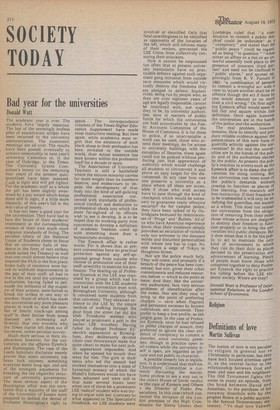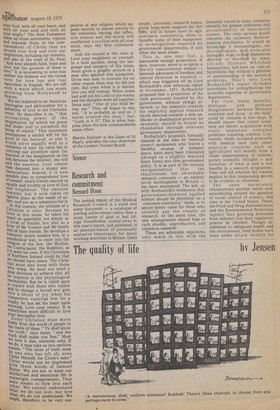Religion
Definitions of love
Martin Sullivan
The notion of love is not peculiar to religion in general nor to Christianity in particular, but they have both focused attention upon it, as the central factor in the relationship between God and man, and man and his neighbour. The Old Testament lights the scene in many an episode, from the bond between David and Jonathan, to the purchase of his runaway dissolute wife by the prophet Hosea at a public auction. to the famous Deuteronomic statement: "Ye shall love Yahweh
Your God, with all your heart, and With all your soul and with all Your might." The New Testament takes up these sentiments, repeats and expands them, in the commandment of Christ that we should love God and love our neighbours, including our enemies, and also in the triad of St. Paul: And now abideth faith, hope and love; but the greatest of these is klve." It is interesting to note that neither the Hebrew nor the Greek term for love has any real equivalent in English. We are left With a word which can mean anything from Hollywood to Heaven.
We are indebted to an American theologian and philosopher for a definition of love in the Christian sense. He describes it as, "that outreaching power of the imagination, by which we grasp ,and make real to ourselves the tieing of others." This statement Presupposes a settled will for the good of the beloved, or else it would serve equally well as a definition of hate. Its value lies in centring our attention upon the function of the imagination as the link between the intellect, the will and the emotion. Love cannot then descend into a sloppy sentimentalism. Indeed, it is now Possible also to comprehend love of oneself, which Christ exacted as equallY and forcibly as love of God and neighbour. The emotion remains, but it now takes its rightful place Eis the result of action, and not as a substitute for it. In this context, the attitude of a Christian is clear. Because he loves in this sense, he takes his stand on apartheid, not simply as ,e lover of blacks, but also as a lover of Mr Vorster and Mr Smith and all their friends. He develops a tolerance which enables him, in a Paradoxical way, to enter into the religion of the Jew, the Muslim, he Confucianist, the Buddhist, as if it were his own. If the Christians of Northern Ireland could do that We should have peace. The Christia,n must also weep with those !in° weep. He does not need a ueeP devotion to achieve this. All he requires is the physiological Mechanism. But he is called upon to rejoice with those who rejoice and to change a forced wry grin into a shout of joy when his ‘competitor outstrips him for a LroPhy he has set his heart upon Winning. Love your enemy. It is soMetimes more difficult to love Your successful rival. f Every Christian must move reely from the world of people to the realm of ideas. "Ye shall know
the truth," says Jesus, " and the truth shall make you free." Must We love it also, someone asks. If We do, it may take us into perilous
raters, "The lover of truth must .,e one who has left all, even 91rist Himself, for Christ's sake." christ would not be displeased
Ivith these words of Samuel ilutler. We are not to keep our
Intellectual and emotional life in
Watertight compartments. They Were meant to flow into each
other. We cannot understand What we do not love, nor love What we do not understand. We Ought, therefore, to be very sus
picious of any religion which appeals entirely or almost entirely to the emotions, leaving the reflective reason and the moral will unaffected. Love God with all your mind, says the first commandment.
And the second is like unto it: Love your neighbour as yourself. In a bold parable, using the language and imagery of His times, Jesus gives a graphic picture of a man who ignored this injunction. Dives was sent to torment for no other reason than that he did not care. But even when it is denied, love can still emerge. When Judas had sold out his Lord to the enemy and the disciples were all together, Jesus said, "One of you shall betray me." They all began to say, not, "It is probably so and so. I never trusted the man," but, "Lord, is it I?" This is what happens when the new commandment takes effect.
Martin Sullivan is the Dean of St Paul's, arid also the new chairman of the London Tourist Board.

































 Previous page
Previous page